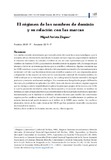| dc.rights.license | http://creativecommons.org/licenses/by-nc-sa/3.0/ve/ | es_VE |
| dc.contributor.author | Arrieta Zinguer, Miguel | |
| dc.date.accessioned | 2018-07-06T06:09:51Z | |
| dc.date.available | 2018-07-06T06:09:51Z | |
| dc.date.issued | 2017 | |
| dc.identifier.issn | 1316-1164 | |
| dc.identifier.uri | http://www.saber.ula.ve/handle/123456789/45107 | |
| dc.description.abstract | Los cambios sociales determinados por la masificación del uso de las nuevas tecnologías y por la extensión del uso de internet ha modificado la manera de hacer negocios, especialmente mediante el comercio electrónico. La columna vertebral de esa red está representada por el Sistema de Nombres de Dominio (NDD), que permite la identificación de las páginas web y la navegación por internet, a través de un sistema que destaca por su sencillez y coherencia. Algunos consideran que los NDD constituye un nuevo signo distintivo del empresario en atención a la necesaria presencia en internet y al valor que los mismos tienen para identificar páginas web, que empresarios ponen a disposición de los usuarios de dicha red de comunicación universal. En el ámbito jurídico, los NDD confluyen en su relación con las marcas, las cuales poseen la función esencial de distinguir productos y servicios en el mundo analógico. Esta tensión entre la regulación propia del Derecho Marcario y la posibilidad de aplicarla a los NDD, destaca la diversa naturaleza y régimen registral que los distingue, ante la imposibilidad de aplicar los principios propios de las marcas a los NDD, lo cual ha producido fenómenos como la ciberocupación y el secuestro inverso de nombres de dominio, así como el marcado interés que estos fenómenos han despertado en diversos organismos internacionales, con la finalidad de establecer métodos efectivos para resolver las controversias surgidas por los conflictos indicados, lo cual ha determinado el establecimiento de políticas en materia internacional, particularmente en el ámbito de la OMPI, para resolver los conflictos planteados, dentro de los cuales destacan las URDP, que han permitido desarrollar una naciente doctrina sobre la materia. | es_VE |
| dc.language.iso | es | es_VE |
| dc.rights | info:eu-repo/semantics/openAccess | es_VE |
| dc.subject | nombres de dominio | es_VE |
| dc.subject | internet | es_VE |
| dc.subject | marca | es_VE |
| dc.subject | ciberocupación | es_VE |
| dc.title | El régimen de los nombres de dominio y su relación con las marcas | es_VE |
| dc.title.alternative | The domain name regime and its relationship with trademarks | es_VE |
| dc.type | info:eu-repo/semantics/article | es_VE |
| dcterms.dateAccepted | 22-11-2017 | |
| dcterms.dateSubmitted | 26-07-2017 | |
| dc.description.abstract1 | The social changes determined by the massification of the use of new technologies and by the extension of the Internet has modified the way of doing business, especially through e-commerce. The backbone of this network is represented by the Domain Name System, which allows the identification of web pages and Internet browsing through a system that stands out for its simplicity and consistency. Some consider that the domain names constitutes a new distinctive sign of the entrepreneur in view of the necessary presence on the Internet and the value that they have to identify web pages that entrepreneurs make available to the users of that communication network. In the legal field, the domain names converges in its relationship with brands, which have the essential function of distinguishing products and services in the analog world. This tension between the proper regulation of the Trademark Law and the possibility of applying it to the Domain Names, highlights the diverse nature and registration regime that distinguishes them, given the impossibility of applying the principles of trademarks to the Domain Names, which has produced phenomena such as the cybersquatting and reverse seizure of domain names, as well as the marked interest that these phenomena have aroused in various international organizations, in order to establish effective methods to resolve disputes arising from the indicated conflicts, which has determined the establishment of international policies, particularly in the field of WIPO, to resolve the conflicts raised, including the URDPs, which have allowed the development of a nascent doctrine on the matter. | es_VE |
| dc.description.colacion | 169-195 | es_VE |
| dc.description.email | miguelarrieta@gmail.com | es_VE |
| dc.identifier.depositolegal | ppi201202ME4039 | |
| dc.identifier.eissn | 2542-3339 | |
| dc.publisher.pais | Venezuela | es_VE |
| dc.subject.centroinvestigacion | Centro de Investigaciones en Propiedad Intelectual (CIPI) | |
| dc.subject.facultad | Facultad de Ciencias Jurídicas y Políticas | es_VE |
| dc.subject.institucion | Universidad de Los Andes (ULA) | es_VE |
| dc.subject.keywords | domain name | es_VE |
| dc.subject.keywords | internet | es_VE |
| dc.subject.keywords | Brand | es_VE |
| dc.subject.keywords | cybersquatting | es_VE |
| dc.subject.postgrado | Postgrado en Propiedad Intelectual | es_VE |
| dc.subject.seccion | Revista Propiedad Intelectual: Doctrina | es_VE |
| dc.subject.thematiccategory | Ciencias Jurídicas y Políticas | es_VE |
| dc.subject.tipo | Revistas | es_VE |
| dc.type.media | Texto | es_VE |


